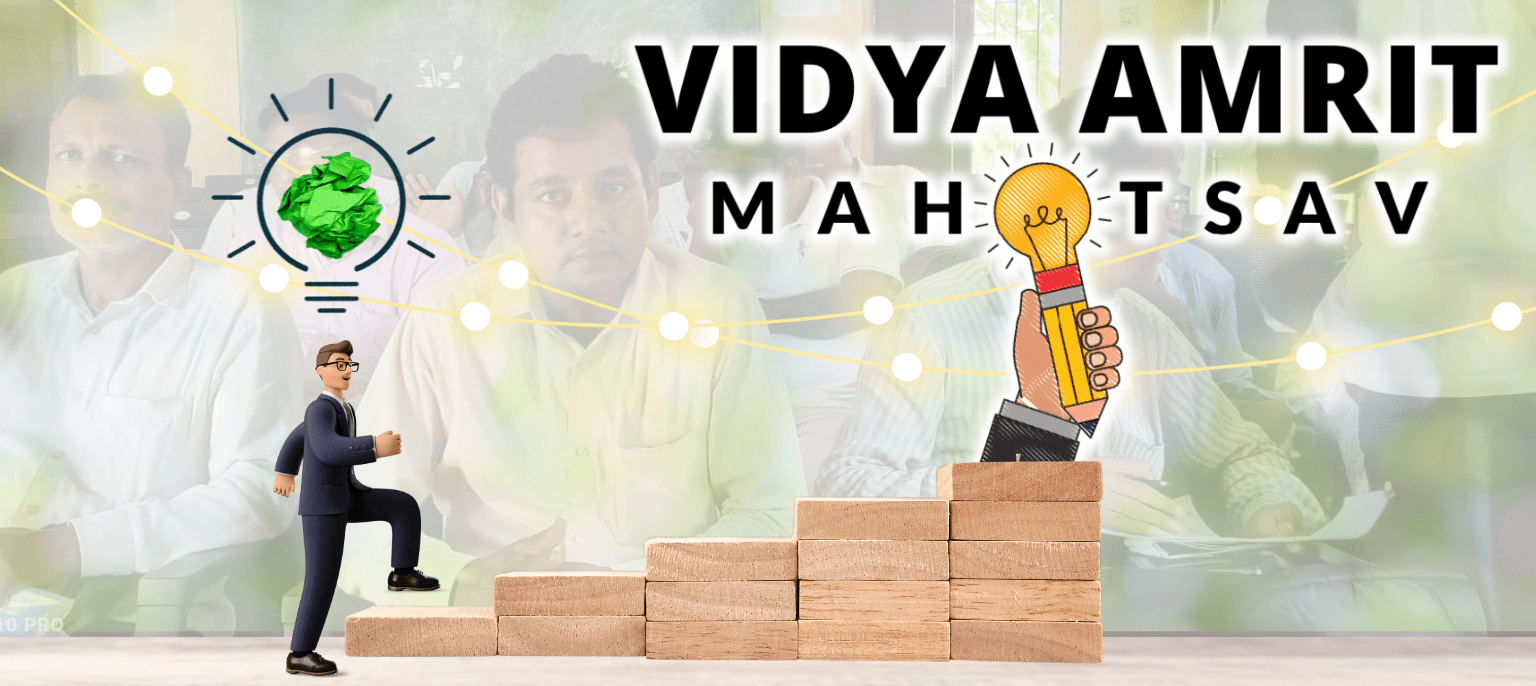
Steps to Design a National Education Festival to Enable Agency and Celebration
Every teacher, every school leader is an innovator. Enter any school and you will find them innovating every day to provide students with a suitable learning environment. The National Education Policy 2020 aptly encourages that these innovations be nurtured and educators from across the country can discover, learn from them and implement according to their needs.
- Work with People First Approach A team was on ground with the implementing body NCERT (CIET) all the time which came to be a huge factor for success. We identified champions in the department for different activities in different stages of the Mahotsav.
- Alignment with State Priorities We enabled +1 shifts in the system, instead of a radical change. The government wanted to focus on pedagogy as the lever of change and we built the program on that, rather than creating something new and having the ecosystem to restart. We worked with the team to imagine how micro-improvements as an approach will help achieve the goal.
- Undertaking a Prototype: The 100 Day Reading Campaign launched by Samagra Shiksha in January 2022 to improve the reading levels of students, was an opportunity to pilot the idea of micro-improvement projects by leveraging the DIKSHA app.
- Adapt the Learnings from the Prototype
We incorporated the following learnings from the pilot into the Mahotsav Design:
- Standard operating procedures outlining the steps to be followed have to be robust, address the needs of every single stakeholder and provide end to end program imagination.
- Consultation workshops on contextualising projects with state PoCs are a must. While we ensured that Mahotsav allows room for contextualisation, hand holding helped in quick adoption.
- Robust communication structures across levels from state to schools, from centre to state are a must too
- A document (from Sarkaar) introducing the program and role of different actors is desirable to energise the ecosystem to adopt the program
- Governance structures should be strong and have a set rhythm
- Collaborate and Co-create at Every Step NCERT (CIET), DIKSHA PMU and all CSOs worked together through all stages and processes – solution design, outreach, NGO ecosystem enablement & tech-readiness, program design and state orchestration. The synergies led to the holistic brainstorming, planning and implementation of the Mahotsav. Collaboration with Samaaj actors provided an extra layer of support in various aspects of the program.
- Ensure Agency/ Contextualisation/ Decentralisation States had the opportunity to experiment and contextualise heavily. They decided how they want to roll out the program, how they want to conduct evaluation in their states with NCERT just providing the recommended solutions. Bihar was an early adopter, Nagaland contextualised it to their own objective calling it Nagaland Reading Festival. Manipur brought in a celebrity to endorse the program and Gujarat without any partner organisation rolled out the program. States employed agency at all stages and could share their learnings with other states.
- Build Stakeholder Comfort with Technology Innumerable group and 1-1 orientation workshops (in English and Hindi both) and open office hours (continuous tech support involving the DIKSHA support team) were conducted so that states were familiarised with micro-improvements approach, projects capability on DIKSHA and templatisation for rollout. As a result, teachers and school leaders could easily move from design to implementation stages on the platform.
- Follow Review and Governance Structures Progress checks focused on data, communication at and across all levels from centre to blocks led to easier adoption and kept the momentum going. Today, we have 600000+ micro-improvement projects triggered in 27 states and UTs.
The overarching principle followed was that God is in details. We ensured a modular yet comprehensive imagination of the program and its implementation stages – program design (alignment of priorities, ensuring actors’ agency, progress checks), solution and resource design (access, guidelines), outreach (channels, messages, formats), state and ecosystem enablement (orchestration, platform, guidelines, support), etc. These efforts led to 510000+ projects triggered across 26 states & UTs during the course of the Mahotsav and the ecosystem is now gearing up for evaluation & recognitions at state and national levels.
This is the third feature in Vidya Amrit Mahotsav series. Read the first piece on the how this festival was brewed with agency and celebration as its core ingredients and the previous piece about how different Sarkaar and Samaaj actors collectively brought this festival to realisation.
Meet the Authors

Vinay R Sanjivi
With a perennial quest to find out what is 'truth', what is 'right' and what is 'beautiful', Vinay would like to 'do', 'whatever' that requires and travel 'wherever' is required, to 'know' and to 'be'. Vinay currently heads the Programmatic efforts at Shikshalokam to empower Education Leadership to create a learning conducive atmosphere to every child in the country. He is a proud alumnus of Azim Premji University, Teach For India, Goldman Sachs and Andhra Pradesh Social Empowerment Fellowship. He would love to retire as a Teaching School Leader.

Vinay R Sanjivi
With a perennial quest to find out what is 'truth', what is 'right' and what is 'beautiful', Vinay would like to 'do', 'whatever' that requires and travel 'wherever' is required, to 'know' and to 'be'. Vinay currently heads the Programmatic efforts at Shikshalokam to empower Education Leadership to create a learning conducive atmosphere to every child in the country. He is a proud alumnus of Azim Premji University, Teach For India, Goldman Sachs and Andhra Pradesh Social Empowerment Fellowship. He would love to retire as a Teaching School Leader.

Shruti Fauzdar
Shruti started her journey in the field of education with Teach for India Fellowship and currently works in the Programs team at ShikshaLokam, designing scale interventions and solutions. Like many of us at ShikshaLokam, she is a fellow believer in children's right to meaningful learning experiences. When not at work, you will find her travelling to historical places or chilling at a monument.

Shruti Fauzdar
Shruti started her journey in the field of education with Teach for India Fellowship and currently works in the Programs team at ShikshaLokam, designing scale interventions and solutions. Like many of us at ShikshaLokam, she is a fellow believer in children's right to meaningful learning experiences. When not at work, you will find her travelling to historical places or chilling at a monument.
